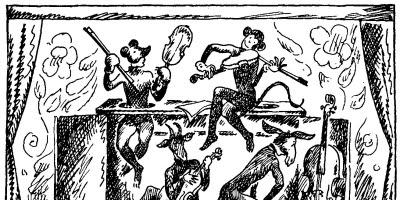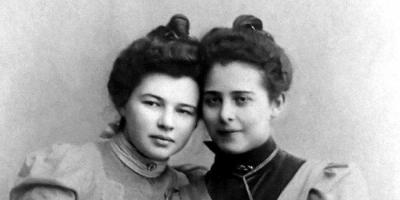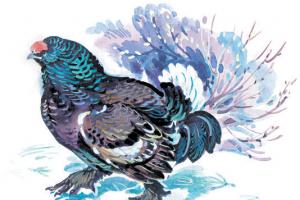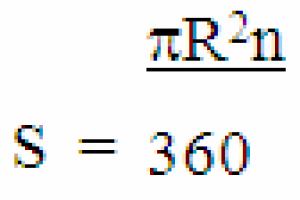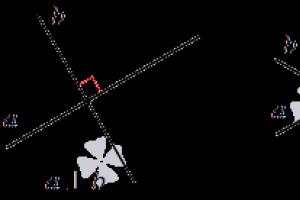Russian poets often dedicated their poems to real or fictitious objects of love and adoration. Thus, they became both the most ordinary women and unearthly muses from the world of dreams. However, there were cases when, in one harmonious unity, two hypostases of femininity merged into a symbolic whole, and this whole became extremely important, fundamental, and paramount for the poet. It is precisely such lyrics that this analysis will be devoted to. Blok, whose “Poems about a Beautiful Lady” still excites hearts, created an imperishable, living image, and therefore it is impossible not to talk about him.
History of the collection
The lyrical cycle about great love, dedicated to the best of women, was created by the poet in the period from 1897 to 1904. This was the time of development of Blok’s stormy, but intense, nervous romance with Lyubov Dmitrievna Mendeleeva, the whole gamut of feelings for which Alexander Alexandrovich, as if confessing, reflected in the poems of the collection. Well-bred and well-educated Lyuba forced the poet to rush from coldness to jealousy, from obsession to indifference, from happiness to joy. In the poems of Blok, who considered himself to be in the direction of symbolism, the entire palette of love emotions acquired even greater significance and was raised to limits inaccessible to the consciousness of the ordinary man in the street.
But this is not all that will precede further analysis. Blok (“Poems about a Beautiful Lady” is the first collection of poetry in the poet’s account) had a very ambivalent attitude towards his beloved: he believed that the earthly, carnal intimacy of two people was an obstacle to the merging of souls, while Love wanted simple female happiness. Perhaps his negative intimate experience had such an influence on the poet: a physical relationship, according to Blok, could only take place with a prostitute, and in the case of a worthy woman this was identified in his mind with vice.
Be that as it may, they met in their youth: she was 16, he was 17. Their communication, friendship and even mutual sympathy were interrupted, but later fate brought them together again, and Alexander Alexandrovich saw in this a mysterious omen, a sign sent over. They got married, although their happiness turned out to be shaky and fragile: Lyuba always begged her husband to leave mysticism and kiss her not on the pages of books, but in real life.
Who is she - a Beautiful Lady?
Without a description of the character of Lyubov Mendeleeva, the analysis itself cannot take place. Blok, whose “Poems about a Beautiful Lady” to some extent played a cruel joke on the girl, spiritualized and idealized her image so much that a real, earthly, interesting personality was lost behind it. Lyuba was serious, strict, unapproachable, and at the same time witty, calm, joyful. Golden-haired and ruddy, the granddaughter of the great chemist Dmitry Ivanovich Mendeleev could not and did not want to spend her whole life searching for the mysterious meanings of love “of a poser with the habits of a veil,” as she herself once called Blok.
Everyone around the poet also saw in her the embodiment of eternal, ideal femininity, and therefore interpreted her gestures, behavior, mood, and outfits in different ways. The marriage of Alexander Alexandrovich and Mendeleeva was considered a sacred mystery, capable of granting, according to V. Solovyov, purification to the world. There were also those who saw exclusively negative properties in Love: for example, Anna Akhmatova called her “a hippopotamus rising on its hind legs” and considered her a complete fool. The woman literally became a hostage to the current situation. As a result, she found what she was looking for - love, understanding, support... But not in her husband, but in another man.

Fight of two (or more) knights
This is the last story that will precede the poetic analysis. Blok, whose poems about the Beautiful Lady could not satisfy the one to whom they were dedicated, soon found himself “overboard”: Lyubov, who felt unwanted and forgotten, began a relationship with her husband’s close friend, the poet Andrei Bely. This connection was finally broken only in 1907. Subsequently, Lyuba entered into an unofficial relationship with G. Chulkov, from whom a child was even born. Blok, who all this time continued to remain Mendeleeva’s legal husband, agreed to become the baby’s father, since he could not have his own children, but the boy died a little more than a week after his birth.

What about the poet?
Alexander Alexandrovich himself was also not sinless: he was noticed in connection with the actress N. Volokhova, whom Lyubov even asked to take care of Sasha, because he is “nervous” and “needs a special approach to him.” As a result, Volokhova decided to interrupt her presence in the life of this strange family. Alexander Alexandrovich died in 1921, Mendeleev - 18 years after his husband. She never married again for the rest of her life.

Sections of the collection and key poems of the cycle. “The wind brought it from afar...”
So, how did Blok bring his worldview to life? “Poems about a Beautiful Lady” (an analysis of a poem, and more than one, will be presented later) as a collection opens with the cycle “Ante Lucem,” which translated from Latin means “before the light.” The lyrical hero here is a lost, lonely man wandering in the darkness. He is cut off from worldly happiness and joy and is unable to experience them. The concept of dual worlds is clearly visible: a creator with poetic thinking and a deep romantic soul wants to know the transcendental, heavenly secrets, and in this he opposes the crowd living in an unremarkable earthly plane.
The cycle of poems about the Beautiful Lady (Blok), the analysis of which requires a careful approach, is the second and central part of the collection of the same name. There is still no sense of reality, stability, but the creator finds hope - the ethereal, unclear, Beautiful Lady must save him, fill his existence with meaning. There is a transformation of the medieval motif of knightly service.

What do poems about a Beautiful Lady look like? Alexander Blok, whose analysis of his life and work has already been partially analyzed, created, for example, the poem “The wind brought from afar...”, which is associated with the wind of change, dynamics, change, rebirth. The eternal, dead night from the poems of the first cycle begins to play with new colors - the reader seems to feel the imminent onset of spring, hear songs, distinguish colors. No, the Beautiful Lady is not here yet, but everything speaks of her imminent arrival, of the destruction of the shackles of the lyrical hero’s loneliness, of renewal.
“I enter dark temples...”
What are the most significant poems about the Beautiful Lady (Blok)? Analysis, a briefly or fully described history of the appearance of the collection, an emphasis on the biography of the poet - none of the sections can do without the lyrical work “I enter dark temples...”. Written in 1902, it is the quintessence of symbolism and mysticism. Here the reader is again faced with uncertainty, the ethereality of the described image, although certainty is sometimes found in the portrait of the Lady, for example, in the poem “She is slender and tall...”.
Here we are faced with the motive of expectation and... fear. The lyrical hero longs for a meeting, but is afraid of what it will bring him, afraid of being unworthy. It is no coincidence that the place of waiting in the work is the church - this only exalts the spirituality of the Beautiful Lady, her crystal purity and holiness.

The final part of the collection
The collection “Poems about a Beautiful Lady” (Block), the analysis of which was presented in detail in this article, closes with the cycle “Crossroads”. Here the motives of hopelessness, confusion of the lyrical hero, anxiety are clearly manifested, and the predominance of realistic components becomes more and more obvious. The social problems raised (in the poems “Factory”, “From the Newspapers”, “Is Everything Calm Among the People?..”) remain without resolution.
The motif of the “end of the world” becomes dominant: the lyrical hero, and the poet himself, no longer hopes for salvation, for the arrival of the Beautiful Lady, for the possibility of purification and rebirth. He withdraws from the spiritual existence and no longer participates in what is happening.
Alexander BlokAlexander Blok was probably the most prominent symbolist of the twentieth century. His “Night. Street. Flashlight. Pharmacy" and the cycle of poems about the Beautiful Lady are still on everyone's lips. Behind the poet's poignant love lyrics lies a personal family drama. And his only love and muse.
* * *
During the day I do the things of vanity,
I turn on the lights in the evening.
Hopelessly foggy - you
You are playing a game in front of me.
I love this lie, this shine,
Your alluring girlish outfit,
Eternal hubbub and street noise,
A row of lanterns running away.
I love and admire and wait
Iridescent colors and words.
I'll come and go again
Into the depths of flowing dreams.
How deceitful you are and how white you are!
I like white lies...
Finishing the day's activities,
I know you will come again in the evening.

Alexander Blok met Lyubov Mendeleeva, the daughter of the famous scientist, when the girl had just turned 16 years old. She loved the color pink, dreamed of becoming a dramatic actress and was not at all seduced by Blok. On the contrary, she called him “a poser with the habits of a veil.” However, after six years of almost manic courtship from Blok, Lyubov agreed to become his wife.
* * *
I'm scared to meet you.
It's worse not to meet you.
I began to wonder at everything
I caught the stamp on everything
Shadows walk along the street
I don’t understand - they are living or sleeping...
Clinging to the church steps,
I'm afraid to look back.
They put their hands on my shoulders,
But I don't remember the names.
There are sounds in my ears
The recent big funeral.
And the gloomy sky is low -
The temple itself was covered.
I know - You are here, You are close.
You are not here. Are you there.
"Stranger" (excerpt)
And every evening, at the appointed hour
(Or am I just dreaming?),
The girl's figure, captured by silks,
A window moves through a foggy window.
And slowly, walking between the drunken,
Always without companions, alone
Breathing spirits and mists,
She sits by the window.
And they breathe ancient beliefs
Her elastic silks
And a hat with mourning feathers,
And in the rings there is a narrow hand.
And chained by a strange intimacy,
I look behind the dark veil,
And I see the enchanted shore
And the enchanted distance.


So the earthly woman Lyubov Mendeleev turned into that very Beautiful Lady, Stranger and Virgin Mary of Russian poetry. Blok idolized her and saw a mystical sign in her every gesture. Of course, later the poet would accept the revolution, then become disillusioned with it and write many significant works on social issues. But in the zero years of the twentieth century, Blok is in love, young, and ready to put his wife on a pedestal, so that he can worship her all his life. Unapproachable, immaculate and elusive - this is how he saw Mendeleeva for the first time, and this is how he immortalized her in literature.
***
She was young and beautiful
And the pure Madonna remained,
Like a mirror of a calm, bright river.
She is carefree, like the blue distance,
It seemed like a sleeping swan;
Who knows, maybe there was sadness...
How my heart was breaking!..
When she sang to me about love,
That song resonated in my soul,
But the ardent blood knew no passion...
How my heart was breaking!..
100 Great Books Demin Valery Nikitich
93. BLOCK “POEMS ABOUT A BEAUTIFUL LADY”
"POEMS ABOUT A BEAUTIFUL LADY"
Blok did not immediately find the name of the cycle and, accordingly, the book of his poems. The theme was clear from the very beginning - Eternal Femininity; in it was seen the answer to existence and all its laws. It came from Goethe and Vladimir Solovyov. The latter, shortly before his death, wrote a program poem with a similar title:
Know this: Eternal Femininity is now
In an incorruptible body he comes to earth...
Initially, Blok also wanted to call the collection of his most intimate poems “On the Eternally Feminine.” But then he took a fresh look at his own stanza:
I enter dark temples,
I perform a poor ritual.
There I am waiting for the Beautiful Lady
In the flickering red lamps.
This is how the name of the collection was born, which immediately brought the young poet to the forefront of Russian literature. For Vladimir Solovyov, Eternal Femininity also appeared in different guises. Her main hypostasis, of course, is Sophia the Wisdom of God - the embodiment of Truth, Goodness and Beauty. Developing Dostoevsky’s thought “Beauty will save the world,” Solovyov argued: “... In the end, Eternal beauty will be fruitful, and the salvation of the world will come from it.” In poetry, on this basis, a whole system of imperishable images was developed - the Virgin of the Rainbow Gate, the Eternal Friend, the Radiant Friend, etc., which became the supporting categories of Russian symbolism. Blok continued to conceptualize the concept of Eternal Femininity. In his poems, under the influence of his first love, Solovyov’s Eternal Friend turned into a Beautiful Lady and the Virgin-Dawn-Kupina, under whose name Blok’s future wife, the daughter of the great Mendeleev, Lyubov Dmitrievna, appears:
You are white, unperturbed in the depths,
In life she is strict and angry.
Secretly anxious and secretly loved,
Virgo, Dawn, Kupina.
“Poems about a Beautiful Lady” is a poetic diary of the formation of Blok’s sublime feelings. Oh, that was truly unearthly love! A true symbol of Love! Knowing his future wife from childhood, he became truly interested in her only at the age of 19, inviting her in the summer at the dacha to play the role of Ophelia in an amateur play, where he himself played Hamlet (since then the theme of Hamlet - Ophelia has become the leitmotif of his work). Four years of reverent love - all of it, at a glance, in “Poems about a Beautiful Lady.” And not only in poetry. Their letters from that time are worthy of being on a par with the correspondence of Abelard and Heloise.
Alexander Blok to Lyubov Mendeleeva (November 10, 1902): My life, without exception, belongs to You from beginning to end... If I ever manage to do something and be imprinted on something, to leave a fleeting trace of a comet, everything will be Yours , from You and to You.
Lyubov Mendeleev - Alexander Blok (November 12, 1902): I have no words to tell you everything that my soul is full of, there are no expressions for my love... I live and have lived only to give you happiness, and this is the only bliss , the purpose of my life.
On August 17, 1903 they got married. For Blok’s work, this event turned into an act of universal significance. He always cosmicized his beloved:
I believe in the Sun of the Covenant,
I see dawns in the distance.
I'm waiting for the universal light
From the spring land "..."
Of an incomprehensible light
The jets trembled.
I believe in the Sun of the Covenant.
I see Your eyes.
Blok cosmosizes any phenomena of nature and life. The starry night takes on a special meaning - a cosmic symbol of cosmic Love. At the same time, the starry sky is personified: the beloved becomes a star, the lover’s eyes turn into stars:
And there will be a moment when you fall
To another heaven.
And in the new skies you will see
Only two stars are my eyes.
The poet paints dizzying cosmic pictures, an integral part of which is himself and his beloved:
Yes, I'll take you with me
And I'll take you there
Where the earth seems like a star,
The star looks like Earth.
And speechless with surprise,
You will see new worlds -
Incredible visions
Creating my game.
But these poems will be written later and dedicated to another woman. Blok's relationship with his wife, which at first was so romantic, turned into a personal tragedy. Even before her marriage, Lyuba Mendeleeva became a universal symbol not only for her husband, but also for his friends, which led to acute conflicts, even leading to a duel with Andrei Bely (fortunately for Russian culture, it did not take place). However, the eternal contradiction between dream and reality soon became clear - between Blok himself and his Beautiful Lady: she turned out to be far from the created poetic ideal, and also an unfaithful wife.
The poet’s personal tragedy was reflected in his poems, in particular, in one of the masterpieces of Blok’s lyrics:
About valor, about exploits, about glory
I forgot on the sorrowful land,
When your face is in a simple frame
It was shining on the table in front of me.
But the hour has come, and you left home,
I threw the treasured ring into the night...
That’s how it was: first the portrait, like an icon, then the removed wedding ring. And what about the Beautiful Lady? It was she who left her husband without warning and came back a long time later with a child from another man. Therefore, the textbook ending of the above poem is quite natural:
Your face in its simple frame
I removed it from the table with my own hand.
However, is it only the Beautiful Lady who is to blame? Three years after his wedding with her, the poet was already recklessly in love with another - actress Natalya Volokhova, and dedicated his best poems, cycles and books to her:
Oh, spring without end and without edge -
An endless and endless dream!
I recognize you, life!
I accept!
And I greet you with the ringing of the shield!
And then there was the singer Lyubov Delma
And you go through thoughts and dreams,
Like the queen of blissful times,
With my head buried in roses,
Immersed in a fabulous dream.
But no matter who fate brings Blok together in the future, and no matter what lyrical masterpieces are born, the former image of the Beautiful Lady, the “Wife Clothed in the Sun,” a sublime, inspired and to some extent unattainable ideal of love, is still radiantly shone between the lines of intimate love lyrics. In this sense, the fate of the famous collection dedicated to the bride-wife turned out to be more than symbolic. Essentially, The Beautiful Lady is all of Blok’s poetry “without end and without edge,” and all of world poetry in general!
From the book Knights author Malov Vladimir IgorevichThe Cult of the Beautiful Lady The rise of chivalry is also associated with the rise of the cult of the Beautiful Lady, one of the most famous and sublime manifestations of chivalry. The fact is that the woman has become completely different; Its very role in society has changed dramatically. In the early era of chivalry, before
From the book Encyclopedic Dictionary (A) author Brockhaus F.A.Alexandrian verses Alexandrian verses are iambic hexameter verses, which, as a distinctive feature, have a caesura after the 3rd foot and usually rhyme in pairs - 2 masculine and 2 feminine devices: So Angelo involuntarily made everyone tremble. They generally grumbled
From the book Encyclopedic Dictionary (B) author Brockhaus F.A.Free verse Free verse is the name given to poems in which rhyme and constant meter are not observed; in the latter respect they are similar to the size of fables, where a wide variety of sizes are found. Free verse differs from prose in external terms only in that it
From the book Encyclopedic Dictionary (G-D) author Brockhaus F.A.Spiritual verses Spiritual verses, in folk literature, arose under the direct influence of Christianity and, mainly, from the material provided by spiritual writing. By accepting the new religion, the peoples of the new Europe were at that stage of mental
From the book In the beginning there was a word. Aphorisms author Dushenko Konstantin VasilievichGood and bad poems Difference between good and bad poems. In good poems, good lines are remembered, and in bad poems, bad lines are remembered. Osip Brik (1888–1945), literary theorist Few people have a lot of good poems. Lazar Lagin (1904–1979), writer There are good poems, bad poems and poems
From the book of Fontainebleau author Ostanina Ekaterina AlexandrovnaThe myth of the beautiful Diana. Fontainebleau under Henry II Francis I failed in his Italian campaigns. At the Battle of Pavia, the defeat was crushing, and the monarch ended up in Spanish captivity. He managed to regain his freedom thanks to the agreement concluded between Charles V, King
From the book Great Soviet Encyclopedia (DU) by the author TSB From the book Secrets of Ancient Civilizations by Thorpe Nick From the book 100 great writers author Ivanov Gennady Viktorovich From the book All the masterpieces of world literature in brief author Novikov V IThe Tale of the Beautiful Ochikubo From the first Japanese novels in the monogatari genre (10th century) Once upon a time, there lived an average adviser named Minamoto no Tadayori, and he had many beautiful daughters, whom he loved and cherished in luxurious chambers. And he had another daughter, unloved,
From the book Foreign Literature of Ancient Epochs, the Middle Ages and the Renaissance author Novikov Vladimir IvanovichThe Tale of the Beautiful Ochikubo - From the first Japanese novels in the monogatari genre (10th century) Once upon a time there lived an average adviser named Minamoto no Tadayori, and he had many beautiful daughters, whom he loved and cherished in luxurious chambers. And he had another daughter, unloved,
From the book Knights author Malov Vladimir IgorevichThe Cult of the Beautiful Lady The rise of chivalry is also associated with the rise of the cult of the Beautiful Lady, one of the most famous and sublime manifestations of chivalry. The fact is that the woman has become completely different; its very role in society changed dramatically. In the early era of chivalry, before
From the book School of Literary Excellence. From concept to publication: stories, novels, articles, non-fiction, screenplays, new media by Wolf JurgenStories and Poems Stories usually describe a short period of time, some part of the characters' lives, or a story with an unexpected twist. Working on a story requires less time and the size of the story can be from one to thirty to forty pages. Just like at work
From the book 150 situations on the road that every driver should be able to solve author Kolisnichenko Denis NikolaevichTip No. 35 The ABS control unit is “tailored” for a certain type of tire, usually for a specific manufacturer and for the correct size. When installing tires from another manufacturer in order to save money, do not forget to make changes to the ABS electronic control unit. Remember, ABS is not
From the book Write your own book: what no one will do for you author Krotov Viktor Gavrilovich From the book Georgian Wine: Renaissance author Sorokina NatalyaChapter 9. With an excellent pedigree If you do not take into account the monastery wines, then this is probably one of the most thoroughbred. In a good way, before us is one of the few manufacturers in today’s Georgia with identifiable historical roots, it sounds, you agree,
Alexander Alexandrovich Blok
Poems about a beautiful lady
Introduction
(1901-1902)
Rest is in vain. The road is steep.
The evening is wonderful. I'm knocking on the gate.
It is alien and strict to the long knock,
You scatter pearls all around.
The tower is high, and the dawn has frozen.
The red secret lay at the entrance.
Who set fire to the tower at dawn,
What did the Princess herself erect?
Each skate has a patterned carving
Red flames are thrown towards you.
The dome rises to the azure heights.
The blue windows lit up with a blush.
All the bells are ringing.
The sunsetless outfit is flooded with spring.
Were you waiting for me at sunset?
Did you light the tower? Did you open the gate?
I went out. Slowly we went down
The twilight of winter falls upon the earth.
You were young in days gone by
They came trustingly from the darkness...
They came and stood behind me,
And they sang with the wind about spring...
And I walked with quiet steps,
Seeing eternity in the depths...
Oh, there were better days alive!
To your song from the depths
Dusk fell on the earth
And dreams arose for eternity!..
The wind brought from afar
Songs of spring hint,
Somewhere light and deep
A piece of sky opened up.
In this bottomless azure,
In the twilight of near spring
The winter storms cried
Starry dreams were flying.
Shy, dark and deep
My strings were crying.
The wind brought from afar
Your sonorous songs.
Quiet evening shadows
The snow lies in blue.
Hosts of discordant visions
Your ashes have been disturbed.
You sleep beyond the distant plain,
Sleeping in a blanket of snow...
Your swan song
The sounds seemed to me.
A voice calling anxiously
Echo in the cold snow...
Is it possible to be resurrected?
Isn't the past just dust?
No, from the Lord's house
Spirit full of immortality
Relatives and friends came out
Songs to disturb my ears.
Hosts of grave visions,
The sounds of living voices...
Quiet evening shadows
The blue ones touched the snow.
The soul is silent. In the cold sky
The same stars still shine for her.
All around about gold or bread
Noisy people shout...
She is silent - and listens to the screams,
And sees distant worlds,
But alone, two-faced
Prepares wonderful gifts
Prepares gifts for his gods
And, anointed, in silence,
With an untiring ear he catches
The distant call of another soul...
So - white birds over the ocean
Inseparable Hearts
They sound a call beyond the fog,
They understand it only to the end.
You are retreating into the scarlet twilight,
In endless circles.
I heard a small echo,
Distant steps.
Are you close or far
Lost in the heights?
Should I wait for a sudden meeting?
In this resounding silence?
Sounds stronger in silence
Distant steps
Are you closing, flaming,
Endless circles?
O. M. Solovyova
On a dark and wild night -
Son of the bottomless depth -
A pale-faced ghost wanders
On the fields of my country,
And the fields in the great darkness
Alien, cold and dark.
Only sometimes, having heard God,
Daughter of the blessed side
From the native palace
Drives away ghostly dreams,
And a lot flashes in the fields
Pure virgins of spring.
Towards spring blossom
The islands have turned green.
Only one song is not finished,
Forgotten eternal words...
The soul is late in its striving,
The guys froze in a vague way,
I didn’t know some secret,
I didn’t understand some dreams...
And now - in envious embarrassment
He looks - the snow has melted,
And the rivers flow discordantly
Finds its shores.
On a cold day, on an autumn day
I'll go back there again
Remember this spring sigh,
See the past image.
I'll come and I won't pay,
Remembering, I won’t burn.
I'll meet you with a song at random
The dawn of a new autumn.
Evil laws of time
The mournful spirit was put to sleep.
Past howl, past groans
If you don't hear me, I'm extinguished.
The very fire is blind eyes
It will not burn with a former dream.
The very day is darker than the night
To the soul lulled.
So, they parted ways at dawn.
All earthly dreams are flying away,
Alien countries are getting closer.
Countries are cold, dumb,
And without love and without spring.
There, far away, with our eyes open,
Visions of loved ones and relatives
Enter new dungeons
And they look at them indifferently.
There, the mother does not recognize her son,
Passionate hearts will go out...
It's hopelessly fading there
My wandering is endless...
And suddenly, on the eve of imprisonment,
I can hear distant steps...
You are lonely - in the distance,
Close the last laps...
Before sunset
Among the centuries-old trees
I love unfaithful beauties
Your eyes and your words.
Farewell, the shadow of the night is coming,
The night is short, like a spring dream,
But I know that tomorrow is a new day,
And a new law for you.
No nonsense, you are not a forest ghost,
But the old man didn't know fairies
With such unfaithful eyes,
With such a changeable soul!
All being and existence agrees
In great, unceasing silence.
Look there sympathetically, indifferently, -
I don’t care – the universe is within me.
I feel and I believe and I know
You cannot seduce a seer with sympathy.
I contain in myself abundantly
All those lights that you burn with.
But there is no more weakness or strength,
The past and the future are in me.
All being and existence is frozen
In the great, unchanging silence.
I'm here at the end, full of insight,
I've crossed the line.
I'm just waiting for a conventional vision,
To fly off into another void.
Someone whispers and laughs
Through the azure fog.
Only I will feel sad in silence
Laughter from dear countries again!
Again a whisper - and in whispers
Someone's caress, like in a dream,
In someone's feminine breath,
Apparently, I am forever happy!
Whisper, laugh, darling,
Sweet image, tender dream;
Apparently you have a force that is not from here
Endowed and inspired.
On a white night the month is red
Floats out in the blue.
Ghostly-beautiful wanders,
Reflected in the Neva.
I see and dream
Execution of secret thoughts.
Is there goodness hidden in you?
Red moon, quiet noise?
Heavenly things cannot be measured by the mind,
Azure is hidden from the minds.
Only occasionally do seraphim bring
Sacred dream for the chosen ones of the worlds.
And I imagined the Russian Venus,
Wrapped in a heavy tunic,
Passionless in purity, joyless without measure,
The facial features are a calm dream.
This is not the first time she has come to earth,
But people crowd around her for the first time
The heroes are not the same, and the knights are different...
And the shine of her deep eyes is strange...
They sound, they rejoice,
Never getting tired
They are celebrating victory
They are blessed forever.
Who will follow the surrounding ringing,
Who will feel even a brief moment
My infinite in the secret womb,
My harmonic language?
Let my freedom be alien to everyone,
May I be a stranger to everyone in my garden
Nature rings and rages
I am her accomplice in everything!
Lonely, I come to you,
Bewitched by the lights of love.
You're guessing. - Don't call me -
I’ve been doing magic for a long time myself.
From the heavy burden of years
I was saved by divination alone,
And again I cast a spell on you,
But the answer is unclear and vague.
Fortune-filled days
I cherish the years - don’t call...
Will the lights go out soon?
Enchanted dark love?
And the heavy sleep of everyday consciousness
You will shake it off, yearning and loving.
Vl. Soloviev
I have a feeling about you. The years pass by -
All in one form I foresee You.
The whole horizon is on fire - and unbearably clear,
And I wait silently, - yearning and loving.
The whole horizon is on fire, and the appearance is near,
But I’m scared: you’ll change your appearance,
And you will arouse impudent suspicion,
Changing the usual features at the end.
Oh, how I will fall - both sadly and low,
Without overcoming deadly dreams!
How clear is the horizon! And radiance is close.
But I’m scared: You will change your appearance.
...and it’s too late to wish,
Everything has passed: both happiness and sorrow.
Vl. Soloviev
Don't be angry and forgive. You bloom alone
Yes, and I can’t return it
These golden dreams, this deep faith...
My path is hopeless.
Blooming with sleepy thoughts, you experience a lot of bliss,
You are strong with azure.
I have a different life and a different road,
And the soul has no time to sleep.
Believe - more unhappy than my young worship
Not in a vast country,
Where your mysterious genius breathed and loved,
Indifferent to me.

